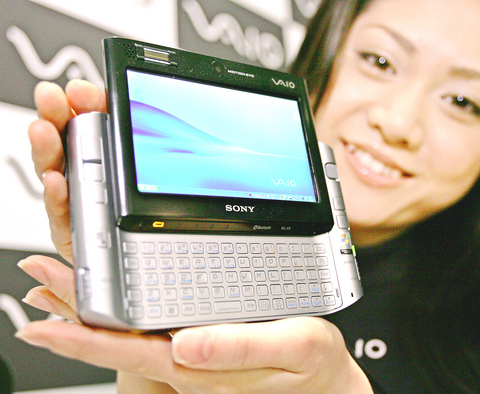Sony Corp, the world's second-biggest consumer electronics maker, introduced a mobile personal computer about the size of a paperback book, joining Samsung Electronics Co and Microsoft Corp to create a market for compact notebooks.
The Vaio type U goes on sale on May 27 in Japan and retails for ¥170,000 (US$1,500), the Tokyo-based company said at a briefing yesterday. The computer, which comes with a 30-gigabyte hard drive, weighs about the same as a 428g bottle of juice.
Sony is targeting users who want portable devices that are more powerful than mobile phones and that, like a personal computer, can be used to surf the Internet, e-mail, bank online and perform other functions on the move.

PHOTO: AFP
Samsung's Q1 compact, which was unveiled in March, has suffered negative reviews over its US$1,100 price tag, battery life and software flaws.
"There is an increasing number of people who are using smart phones and mobile phones, but the functions are limited," said Yoshihisa Ishida, head of Sony's Vaio business. "We want to provide something that can fulfill those needs."
Microsoft, which is promoting the "ultra-mobile PC," is betting users may buy the new device as a second or third machine, expanding the company's foothold.
Samsung's Q1 was criticized for shortcomings that reviewers said render the machine almost unusable, according to reviewers Walter Mossberg of the Wall Street Journal and David Pogue of the New York Times.
Sony will introduce another mobile PC late next month that will use NAND flash memory chips to store data, instead of a hard drive. NAND flash memory chips are faster, lighter and more shock resistant than hard disk drives used to store data on portable computers.
Separately, Sony yesterday unveiled a Vaio notebook PC and desktop PC with a Blu-ray high-definition DVD drive, which allows the playback of discs that store at least five times more data than conventional DVDs.
Samsung, based in Suwon, South Korea, is selling the ultra-mobile PCs in the US and Europe, and Founder Technology Group Corp, the No. 4 seller of PCs in China, will sell them in China. Starting next month, Asustek Computer Inc (
Microsoft on April 14 began selling in Japan an ultra-mobile PC that can be operated by touching its liquid-crystal display screen, and is testing the computer at Japanese schools to attract young users.
The Microsoft PC is called the SmartCaddie and is made by PBJ Inc, a Tokyo-based maker of touch panels. It sells for ¥99,800, comes with a 40-gigabyte hard disk drive and weighs 860g, about half as much as a conventional notebook.

A magnitude 7.0 earthquake struck off Yilan at 11:05pm yesterday, the Central Weather Administration (CWA) said. The epicenter was located at sea, about 32.3km east of Yilan County Hall, at a depth of 72.8km, CWA data showed There were no immediate reports of damage. The intensity of the quake, which gauges the actual effect of a seismic event, measured 4 in Yilan County area on Taiwan’s seven-tier intensity scale, the data showed. It measured 4 in other parts of eastern, northern and central Taiwan as well as Tainan, and 3 in Kaohsiung and Pingtung County, and 2 in Lienchiang and Penghu counties and 1

FOREIGN INTERFERENCE: Beijing would likely intensify public opinion warfare in next year’s local elections to prevent Lai from getting re-elected, the ‘Yomiuri Shimbun’ said Internal documents from a Chinese artificial intelligence (AI) company indicated that China has been using the technology to intervene in foreign elections, including propaganda targeting Taiwan’s local elections next year and presidential elections in 2028, a Japanese newspaper reported yesterday. The Institute of National Security of Vanderbilt University obtained nearly 400 pages of documents from GoLaxy, a company with ties to the Chinese government, and found evidence that it had apparently deployed sophisticated, AI-driven propaganda campaigns in Hong Kong and Taiwan to shape public opinion, the Yomiuri Shimbun reported. GoLaxy provides insights, situation analysis and public opinion-shaping technology by conducting network surveillance

‘POLITICAL GAME’: DPP lawmakers said the motion would not meet the legislative threshold needed, and accused the KMT and the TPP of trivializing the Constitution The Legislative Yuan yesterday approved a motion to initiate impeachment proceedings against President William Lai (賴清德), saying he had undermined Taiwan’s constitutional order and democracy. The motion was approved 61-50 by lawmakers from the main opposition Chinese Nationalist Party (KMT) and the smaller Taiwan People’s Party (TPP), who together hold a legislative majority. Under the motion, a roll call vote for impeachment would be held on May 19 next year, after various hearings are held and Lai is given the chance to defend himself. The move came after Lai on Monday last week did not promulgate an amendment passed by the legislature that

AFTERMATH: The Taipei City Government said it received 39 minor incident reports including gas leaks, water leaks and outages, and a damaged traffic signal A magnitude 7.0 earthquake struck off Taiwan’s northeastern coast late on Saturday, producing only two major aftershocks as of yesterday noon, the Central Weather Administration (CWA) said. The limited aftershocks contrast with last year’s major earthquake in Hualien County, as Saturday’s earthquake occurred at a greater depth in a subduction zone. Saturday’s earthquake struck at 11:05pm, with its hypocenter about 32.3km east of Yilan County Hall, at a depth of 72.8km. Shaking was felt in 17 administrative regions north of Tainan and in eastern Taiwan, reaching intensity level 4 on Taiwan’s seven-tier seismic scale, the CWA said. In Hualien, the